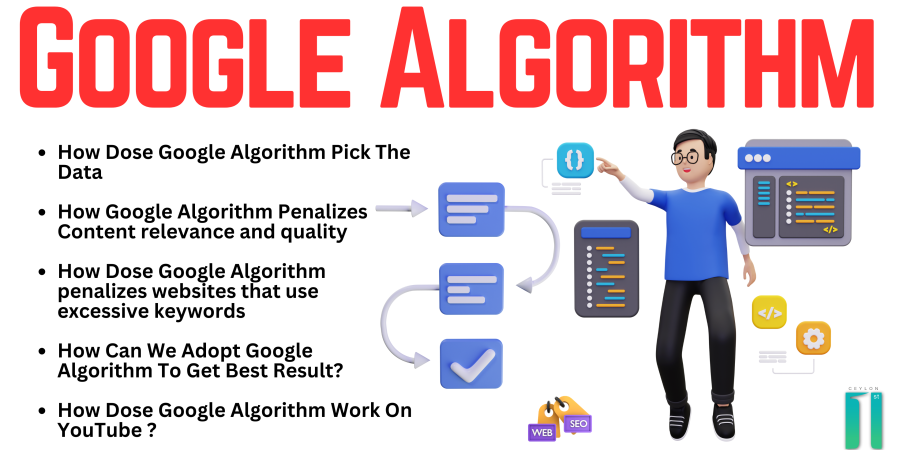Google Algorithm refers to the complex set of rules and processes that Google uses to determine the ranking of websites in its search engine results pages (SERPs). Google uses a variety of factors to evaluate the relevance, quality, and authority of web pages, including the content, structure, and links of the website. The goal of the Google Algorithm is to provide users with the most relevant and useful results for their search queries.
The Google Algorithm is constantly evolving, with updates and changes made on a regular basis to improve the quality of search results. Some of the major algorithm updates over the years have included Google Panda, which targeted low-quality and thin content websites, and Google Penguin, which focused on penalizing websites with spammy or manipulative links. Other notable updates include Google Hummingbird, which introduced a more conversational search experience, and Google RankBrain, which introduced machine learning and AI to the ranking process.
How Dose Google Algorithm Pick The Data
Google Algorithm uses a variety of methods to collect and pick data, including crawling and indexing web pages, analysing the content of those pages, and using algorithms to rank and display search results. Here is an overview of the process:
- Crawling: Google uses automated bots, known as “spiders” or “crawlers”, to scan the web and discover new web pages. These bots follow links from one page to another, indexing the content they find along the way.
- Indexing: Once a page has been crawled, its content is added to Google’s index, a vast database of web pages that can be searched. Google’s index includes information about the content of the page, its structure, and its links.
- Ranking: When a user enters a search query, Google’s algorithms analyze the content of its index to determine the most relevant results. The ranking algorithms use a variety of factors to determine the relevance of a page, including its content, structure, links, and user behaviour metrics.
Some of the key factors that Google considers when ranking web pages include:
- Content relevance and quality
- Page load speed and mobile-friendliness
- User experience and engagement metrics
- Domain authority and backlinks
- Social signals, such as shares and likes
Overall, Google’s goal is to provide users with the most relevant and useful search results possible, using a combination of data and algorithms to achieve this.
How Google Algorithm Penalise Content relevance and quality
Google Algorithm uses various methods to penalize low-quality and irrelevant content. Here are some of the ways:
- Content duplication: Google penalizes websites that have duplicate content, meaning content that is copied from other sources or appears on multiple pages of the same website. This is because duplicate content can cause confusion for users and make it difficult for Google to determine the most relevant page to show in search results.
- Keyword stuffing: Google penalizes websites that use excessive keywords or phrases in an attempt to manipulate search engine rankings. This is known as keyword stuffing, and it can make content appear unnatural and spammy.
- Thin content: Google penalizes websites that have thin content, meaning content that is shallow, low-quality, or lacks substance. Thin content can include pages with very little text, pages that are primarily made up of ads or affiliate links, or pages that provide little value to users.
- Spammy links: Google penalizes websites that use spammy links, meaning links that are obtained through manipulative tactics such as link exchanges, paid links, or link farms. These links can be seen as an attempt to artificially boost a website’s ranking, and they can harm the user experience by leading to irrelevant or low-quality content.
- User engagement metrics: Google uses user engagement metrics, such as bounce rate and dwell time, to determine the relevance and quality of content. If users quickly leave a website without interacting with it or spend very little time on a page, it can be an indication that the content is not relevant or engaging. This can result in a lower ranking for that content.
Overall, Google Algorithm penalises content that is manipulative, low-quality, or not useful to users, and rewards content that is informative, engaging, and relevant to search queries.
How Dose Google Algorithm penalises websites that use excessive keywords
Google Algorithm penalizes websites that use excessive keywords or phrases in several ways. Here are some of the most common penalties:
- Lowered ranking: Websites that use excessive keywords may be penalized by Google with lower search rankings. This means that the website will appear lower in the search results and receive less traffic as a result.
- De-indexing: In severe cases, Google may de-index a website that uses excessive keywords. This means that the website will be removed from Google’s index entirely, making it impossible for users to find it through organic search.
- Manual penalties: Google may also impose manual penalties on websites that use excessive keywords. These penalties are imposed by human reviewers who evaluate the website and determine if it violates Google’s guidelines. If a website is found to be in violation, it may be penalized with a lower ranking or de-indexed.
- Algorithmic penalties: Google’s algorithms are designed to detect websites that use excessive keywords and penalize them accordingly. These penalties are often automatic and can result in a lower search ranking or de-indexing.
Overall, it’s important for website owners to use keywords in a natural and relevant way, without overloading their content with too many keywords. This can help them avoid penalties and improve their search rankings over time.
How Can We Adopt Google Algorithm To Get Best Result?
Adopting Google Algorithm to get the best search results requires a combination of understanding the algorithm’s principles and best practices in search engine optimization (SEO). Here are some steps you can take to optimize your website for Google Algorithm:
- Provide high-quality content: Google values high-quality, relevant content that provides value to users. Make sure your website’s content is original, informative, and engaging for your target audience.
- Optimize your website for mobile devices: As more users search from mobile devices, Google gives preference to mobile-friendly websites. Make sure your website is optimized for mobile devices, with a responsive design that adapts to different screen sizes.
- Use relevant keywords: Identify the keywords and phrases your target audience is searching for and use them naturally in your content. Avoid overusing keywords, as this can result in penalties.
- Optimize your website’s structure: Ensure that your website has a clear and logical structure that makes it easy for users and search engines to navigate. Use descriptive URLs, titles, and meta descriptions that accurately reflect the content of each page.
- Build high-quality backlinks: Backlinks from other high-quality websites can help improve your website’s authority and ranking. Focus on building natural, relevant backlinks from reputable sources.
- Monitor your website’s performance: Use analytics tools to monitor your website’s performance and identify areas for improvement. This can help you make data-driven decisions to optimize your website for Google Algorithm.
By following these best practices, you can help your website rank higher in Google’s search results, attract more traffic, and provide a better user experience for your audience.
How Dose Google Algorithm Work On YouTube ?
Google Algorithm works differently on YouTube compared to how it works on Google search. Here’s a general overview of how it works on YouTube:
- Video content analysis: Google Algorithm on YouTube analyses video content to determine the relevance and quality of the video. It uses automated systems to understand the video’s topic, keywords, and content to match it with user search queries.
- Metadata analysis: Google Algorithm also analyzes the metadata associated with a video, including the title, description, and tags. These elements provide context about the video and help YouTube understand what the video is about.
- User engagement metrics: Google Algorithm on YouTube also takes into account user engagement metrics, such as views, watch time, likes, and comments. The algorithm uses these metrics to determine the popularity and relevance of a video.
- Recommendations: Google Algorithm on YouTube also uses user data to provide personalized video recommendations to users based on their watch history, preferences, and search queries.
- Monetization: Google Algorithm on YouTube also determines whether a video is eligible for monetization, based on factors such as the video’s content, metadata, and compliance with YouTube’s community guidelines and advertiser-friendly content guidelines.
Overall, Google Algorithm on YouTube prioritizes video content that is relevant, high-quality, and engaging to users. By optimizing your video content with relevant metadata, keywords, and high-quality production, and engaging your audience with valuable content, you can improve your video’s ranking and visibility on YouTube.
CEYLON FIRST



Leave feedback about this